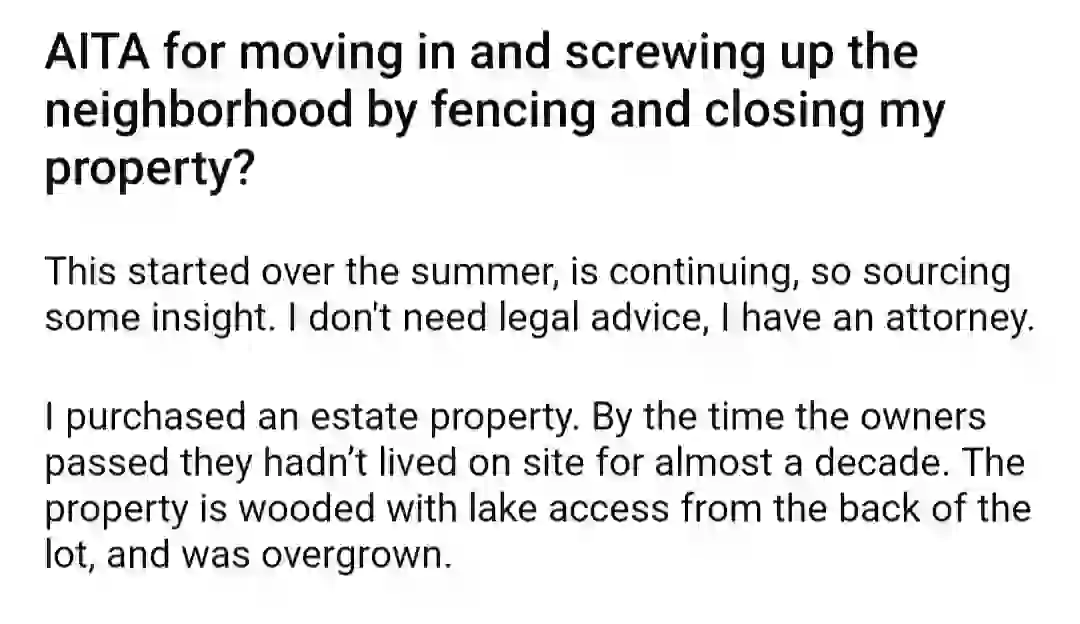


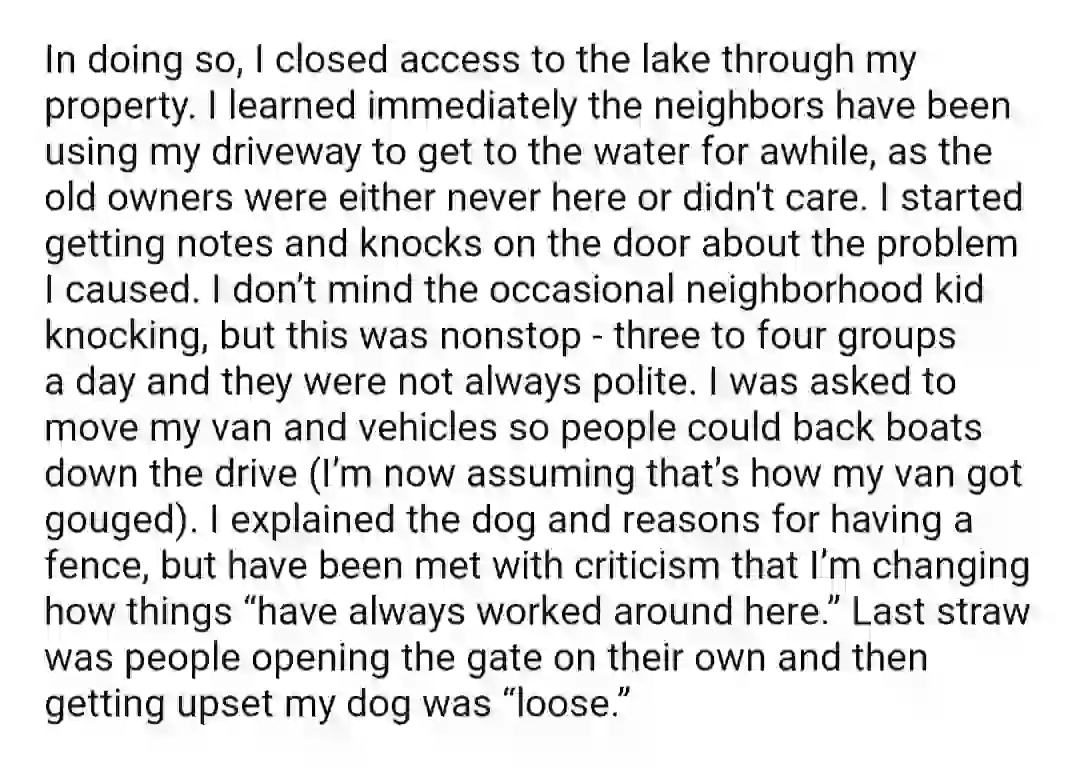

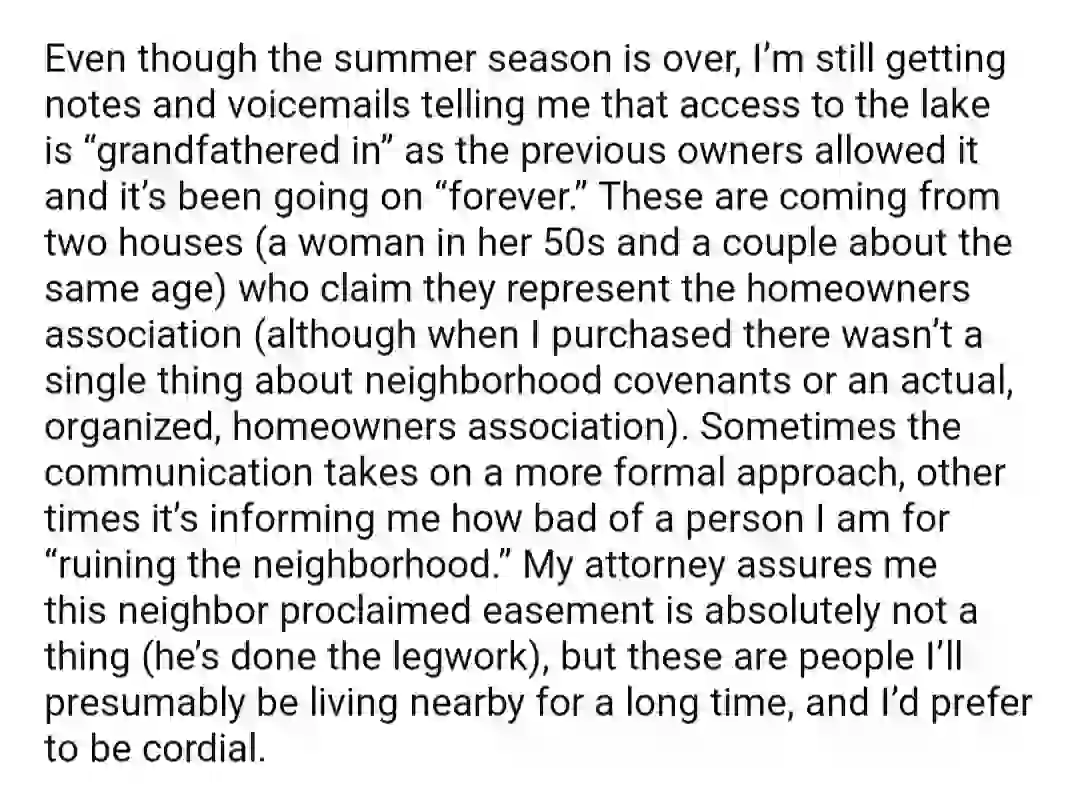









 (via: reddit)
(For the tonally challenged – this whole post is sarcasm. I’m holding up a sarcasm sign.)
(via: reddit)
(For the tonally challenged – this whole post is sarcasm. I’m holding up a sarcasm sign.) 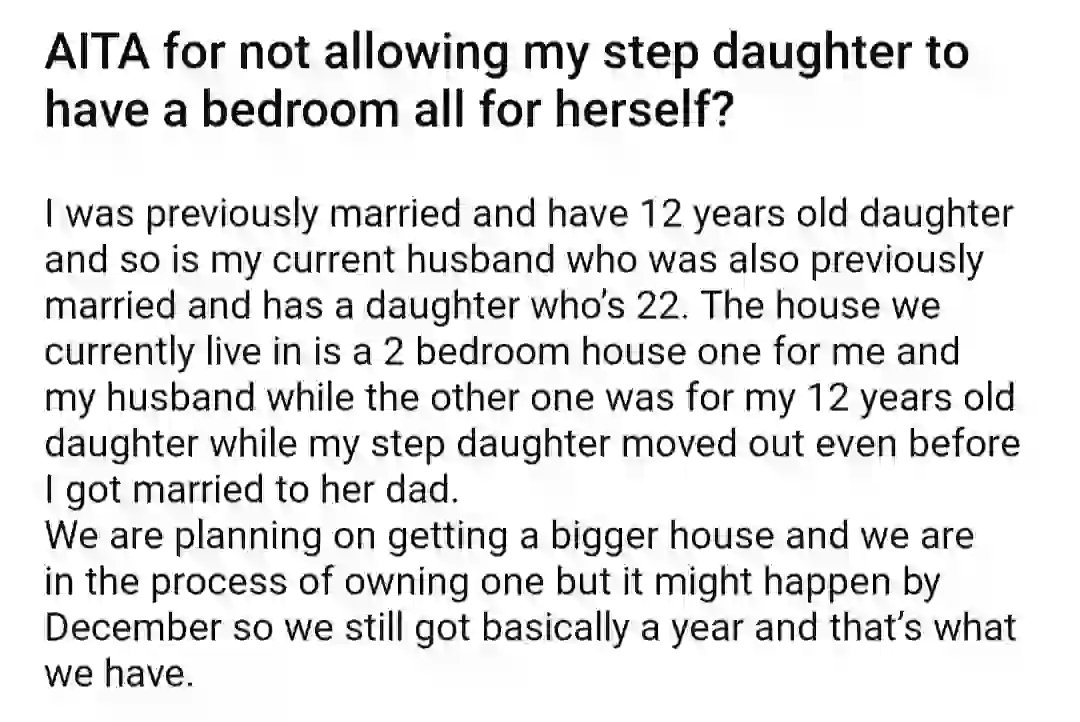 The family currently resides in a two-bedroom house, with one room designated for the user and her husband, while the other serves as the bedroom for their 12-year-old daughter. Dana, who had moved out previously, recently lost her job and sought refuge with her father’s family. However, tensions arose when Dana learned that she would have to share a room with her younger stepsister. She expressed her desire for privacy and her reluctance to share a room.
The family currently resides in a two-bedroom house, with one room designated for the user and her husband, while the other serves as the bedroom for their 12-year-old daughter. Dana, who had moved out previously, recently lost her job and sought refuge with her father’s family. However, tensions arose when Dana learned that she would have to share a room with her younger stepsister. She expressed her desire for privacy and her reluctance to share a room.
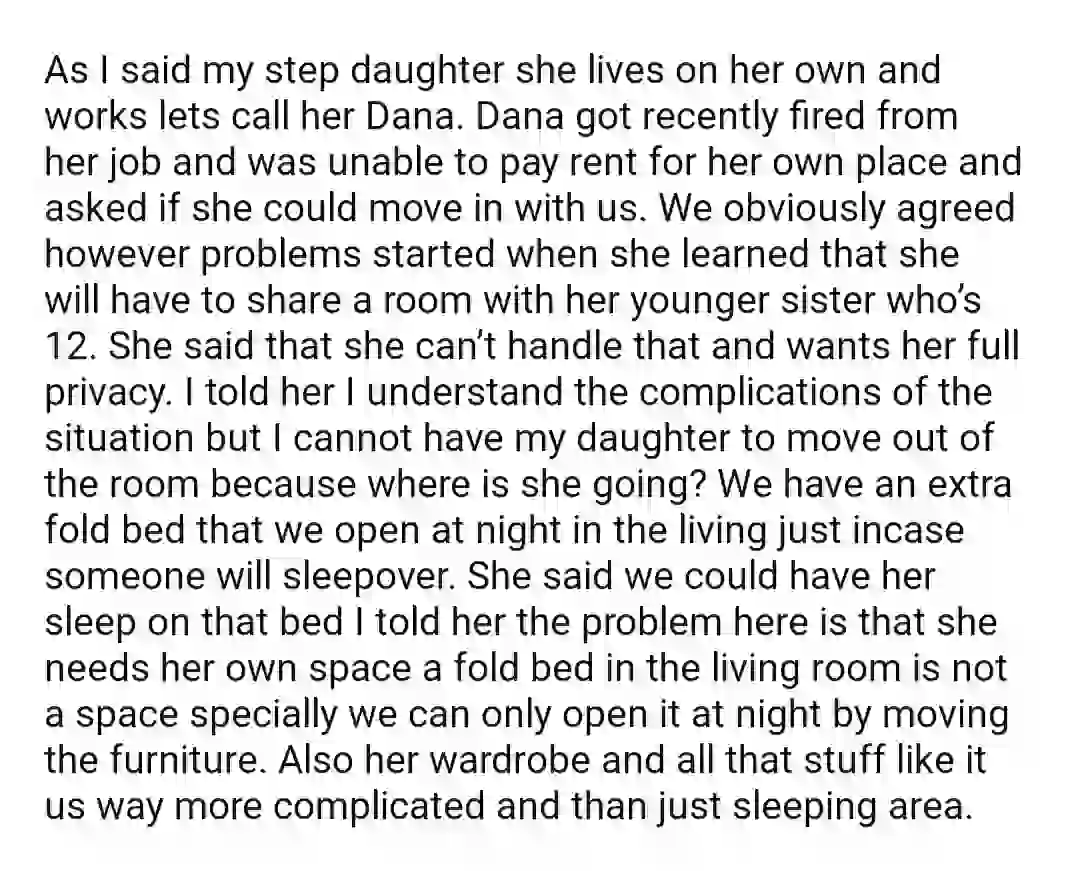 The stepmother, caught in the middle, tried to find a solution to accommodate everyone’s needs and concerns. She considered the limited space in their home and the logistics of adding an extra bed in the living room, where they only had space to set it up at night. The stepmother also addressed wardrobe space and offered to provide additional wardrobes to ensure everyone’s belongings would fit comfortably. Despite her efforts to mediate, Dana was resistant to compromise, leading to a difficult situation that required resolution.
The stepmother, caught in the middle, tried to find a solution to accommodate everyone’s needs and concerns. She considered the limited space in their home and the logistics of adding an extra bed in the living room, where they only had space to set it up at night. The stepmother also addressed wardrobe space and offered to provide additional wardrobes to ensure everyone’s belongings would fit comfortably. Despite her efforts to mediate, Dana was resistant to compromise, leading to a difficult situation that required resolution.
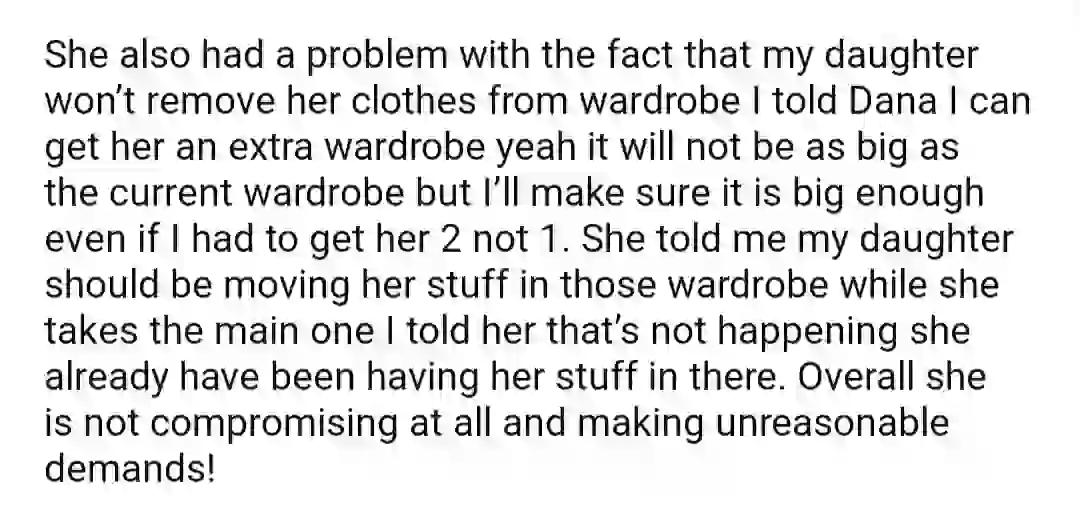
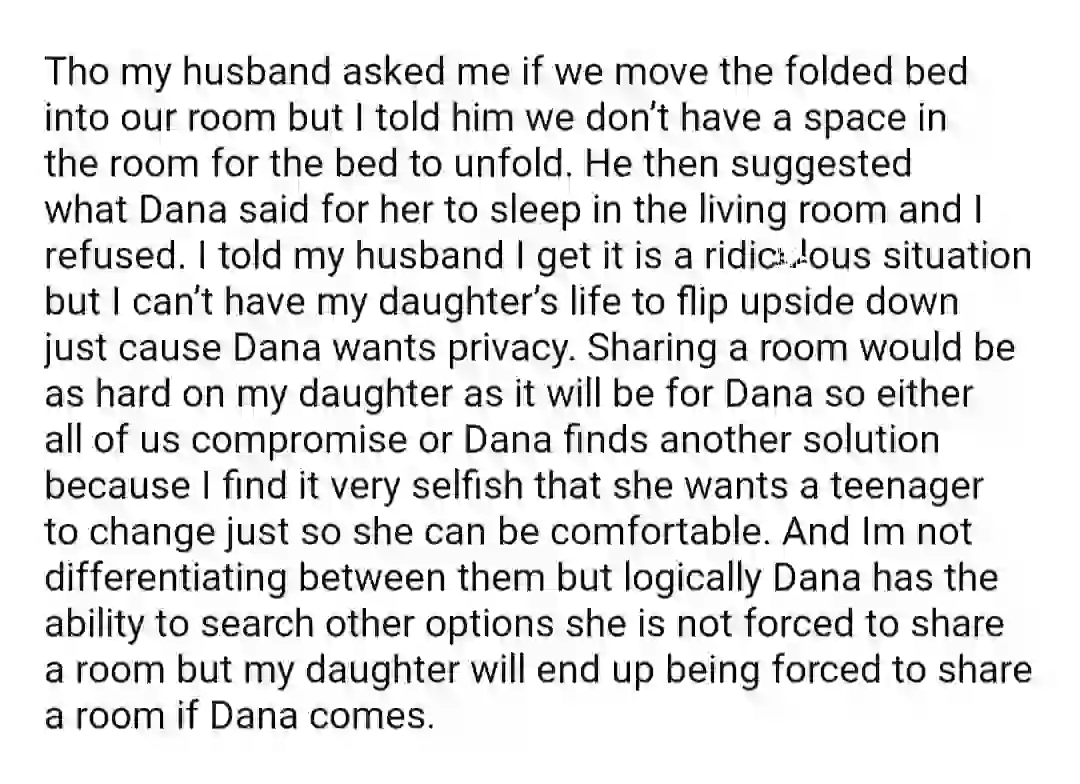 This Reddit post has sparked a debate about shared living spaces, family dynamics, and the challenges of balancing the needs and comfort of family members. The situation remains unresolved, leaving the question of whether the stepmother was in the wrong for not allowing her stepdaughter a bedroom to herself. The responses from the online community shed light on the complexities of blended families and the importance of open communication and compromise.
This Reddit post has sparked a debate about shared living spaces, family dynamics, and the challenges of balancing the needs and comfort of family members. The situation remains unresolved, leaving the question of whether the stepmother was in the wrong for not allowing her stepdaughter a bedroom to herself. The responses from the online community shed light on the complexities of blended families and the importance of open communication and compromise.
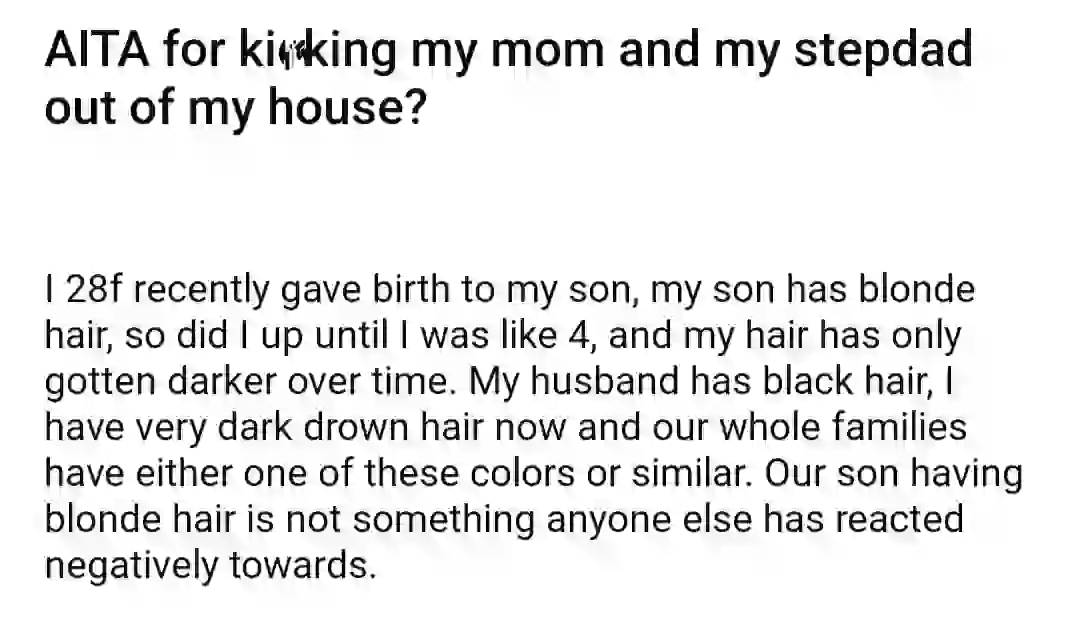 The Background: A 28-year-old woman recently gave birth to her son, who, to her surprise, has blonde hair, a feature not commonly found in her or her husband’s family. While this anomaly isn’t a cause for concern, her stepfather repeatedly makes insensitive comments, suggesting that her son’s appearance is due to infidelity on her part. These remarks have created tension in the household.
The Background: A 28-year-old woman recently gave birth to her son, who, to her surprise, has blonde hair, a feature not commonly found in her or her husband’s family. While this anomaly isn’t a cause for concern, her stepfather repeatedly makes insensitive comments, suggesting that her son’s appearance is due to infidelity on her part. These remarks have created tension in the household.
 The Stepmother’s Perspective: The woman’s stepfather has been visiting regularly, but his habit of making inappropriate jokes and insinuations about her baby’s hair color has strained their relationship. Despite her attempts to politely ask him to stop, the comments persist. The woman, along with her husband, has expressed discomfort with his behavior and finds it neither funny nor appropriate.
The Stepmother’s Perspective: The woman’s stepfather has been visiting regularly, but his habit of making inappropriate jokes and insinuations about her baby’s hair color has strained their relationship. Despite her attempts to politely ask him to stop, the comments persist. The woman, along with her husband, has expressed discomfort with his behavior and finds it neither funny nor appropriate.
 The Husband’s Reaction: The woman’s husband, who is supportive of his wife, has also grown weary of her stepfather’s comments. During a recent visit, he reached his breaking point and confronted the stepfather about his inappropriate remarks, demanding that he stop. This confrontation escalated into a heated argument, leading the woman to ask her mother and stepfather to leave their home.
The Husband’s Reaction: The woman’s husband, who is supportive of his wife, has also grown weary of her stepfather’s comments. During a recent visit, he reached his breaking point and confronted the stepfather about his inappropriate remarks, demanding that he stop. This confrontation escalated into a heated argument, leading the woman to ask her mother and stepfather to leave their home.
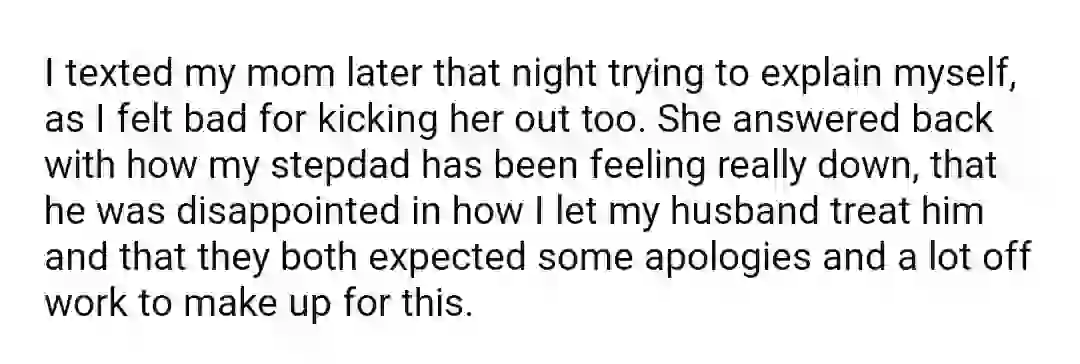 The Decision to Kick Them Out: After this incident, the woman decided to ask her mother and stepfather to leave, setting a boundary to protect her family from further discomfort. While she acknowledges her stepfather’s feelings of disappointment, she remains firm in her decision.
The Decision to Kick Them Out: After this incident, the woman decided to ask her mother and stepfather to leave, setting a boundary to protect her family from further discomfort. While she acknowledges her stepfather’s feelings of disappointment, she remains firm in her decision.
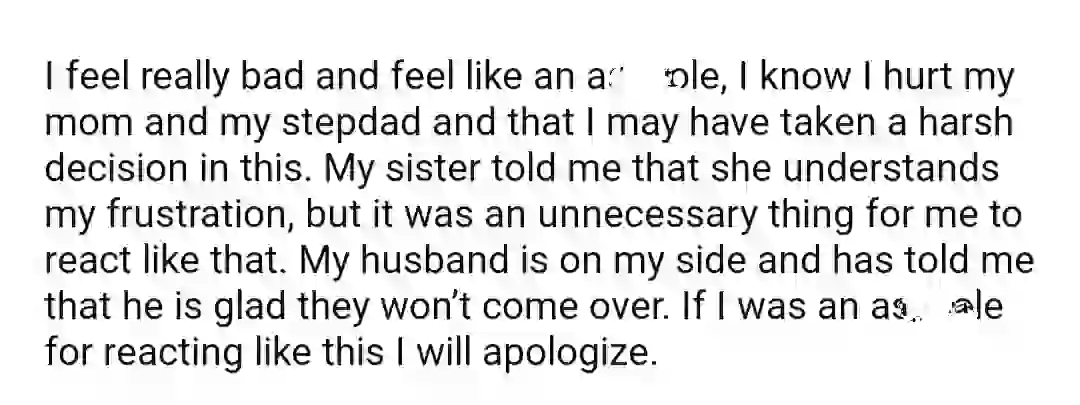 Reactions from Family and Friends: The woman’s sister and husband support her decision, recognizing the emotional toll her stepfather’s comments have taken on the household. However, her mother insists that the woman and her husband should make amends with the stepfather. This has left the woman conflicted and questioning whether her actions were too extreme.
Conclusion: This AITA scenario delves into the complex dynamics of family relationships and the importance of setting boundaries. The woman was pushed to her limit due to her stepfather’s relentless insensitive comments about her son’s appearance. Her husband, who reached his breaking point, also supported her decision to ask them to leave. The ultimate question remains: AITA (Am I the Asshole) for demanding respect and protecting her family’s emotional well-being? Readers are invited to share their opinions in the comments.
Reactions from Family and Friends: The woman’s sister and husband support her decision, recognizing the emotional toll her stepfather’s comments have taken on the household. However, her mother insists that the woman and her husband should make amends with the stepfather. This has left the woman conflicted and questioning whether her actions were too extreme.
Conclusion: This AITA scenario delves into the complex dynamics of family relationships and the importance of setting boundaries. The woman was pushed to her limit due to her stepfather’s relentless insensitive comments about her son’s appearance. Her husband, who reached his breaking point, also supported her decision to ask them to leave. The ultimate question remains: AITA (Am I the Asshole) for demanding respect and protecting her family’s emotional well-being? Readers are invited to share their opinions in the comments.
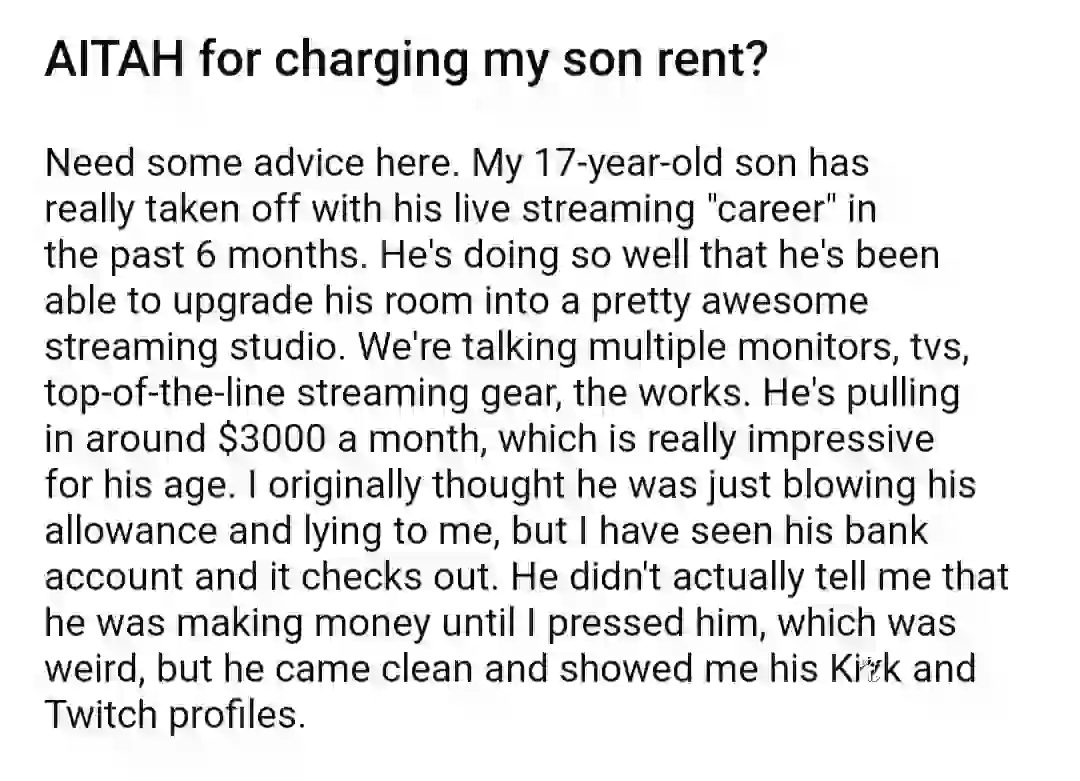 Initially, the parent was unaware of their son’s earnings, suspecting that he was spending his allowance recklessly. However, after seeing his bank account and Twitch and Kick profiles, the truth became evident. The son hadn’t disclosed his income until pressed by his parents, which raised some eyebrows.
The parent proposed the idea of their son paying a modest monthly rent of $600, considering the quality of his living arrangements. His room had been upgraded into an impressive streaming studio, complete with multiple monitors, top-tier streaming equipment, and even a lounge area. While the parent viewed this as an opportunity to teach financial responsibility and adulthood lessons, their spouse had a different perspective.
The mother firmly believed that they shouldn’t ask their son for rent, arguing that providing him with a roof over his head is their parental duty, regardless of external circumstances. Additionally, she pointed out that he relies on their household’s WiFi and electricity for his streaming activities, which already comes with its own expenses.
Initially, the parent was unaware of their son’s earnings, suspecting that he was spending his allowance recklessly. However, after seeing his bank account and Twitch and Kick profiles, the truth became evident. The son hadn’t disclosed his income until pressed by his parents, which raised some eyebrows.
The parent proposed the idea of their son paying a modest monthly rent of $600, considering the quality of his living arrangements. His room had been upgraded into an impressive streaming studio, complete with multiple monitors, top-tier streaming equipment, and even a lounge area. While the parent viewed this as an opportunity to teach financial responsibility and adulthood lessons, their spouse had a different perspective.
The mother firmly believed that they shouldn’t ask their son for rent, arguing that providing him with a roof over his head is their parental duty, regardless of external circumstances. Additionally, she pointed out that he relies on their household’s WiFi and electricity for his streaming activities, which already comes with its own expenses.
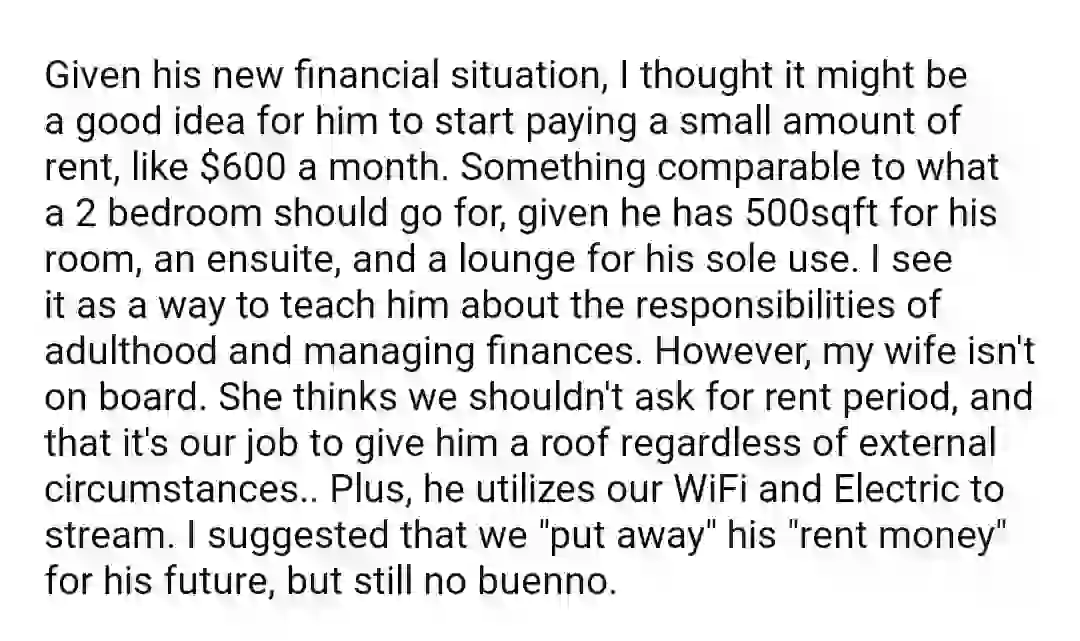 These differing viewpoints have led to heated discussions within the family, with the parent who proposed rent emphasizing the importance of preparing their son for the real world. They drew from their own upbringing, where they had to contribute to household expenses once they started earning an income.
The situation becomes even more complex when considering that the son has completed high school early and is currently in a “gap year” before deciding whether to pursue higher education. The family must now navigate the fine line between treating him as a responsible adult and acknowledging that he is not yet legally considered one.
The Reddit post garnered various opinions from the online community. Some readers sided with the parent advocating for rent, believing that it’s a valuable lesson in financial responsibility. Others empathized with the mother, arguing that supporting their son through this transitional period is essential, especially considering the unique circumstances of the COVID-19 pandemic.
These differing viewpoints have led to heated discussions within the family, with the parent who proposed rent emphasizing the importance of preparing their son for the real world. They drew from their own upbringing, where they had to contribute to household expenses once they started earning an income.
The situation becomes even more complex when considering that the son has completed high school early and is currently in a “gap year” before deciding whether to pursue higher education. The family must now navigate the fine line between treating him as a responsible adult and acknowledging that he is not yet legally considered one.
The Reddit post garnered various opinions from the online community. Some readers sided with the parent advocating for rent, believing that it’s a valuable lesson in financial responsibility. Others empathized with the mother, arguing that supporting their son through this transitional period is essential, especially considering the unique circumstances of the COVID-19 pandemic.
 Ultimately, the question of whether the parent is in the right for expecting their son to contribute rent remains a matter of perspective. It highlights the challenges parents face when trying to balance teaching financial responsibility with providing emotional and financial support during a pivotal time in their child’s life.
In the end, the family will need to find a compromise that aligns with their values and prepares their son for the responsibilities of adulthood while maintaining a nurturing and supportive environment.
Ultimately, the question of whether the parent is in the right for expecting their son to contribute rent remains a matter of perspective. It highlights the challenges parents face when trying to balance teaching financial responsibility with providing emotional and financial support during a pivotal time in their child’s life.
In the end, the family will need to find a compromise that aligns with their values and prepares their son for the responsibilities of adulthood while maintaining a nurturing and supportive environment.
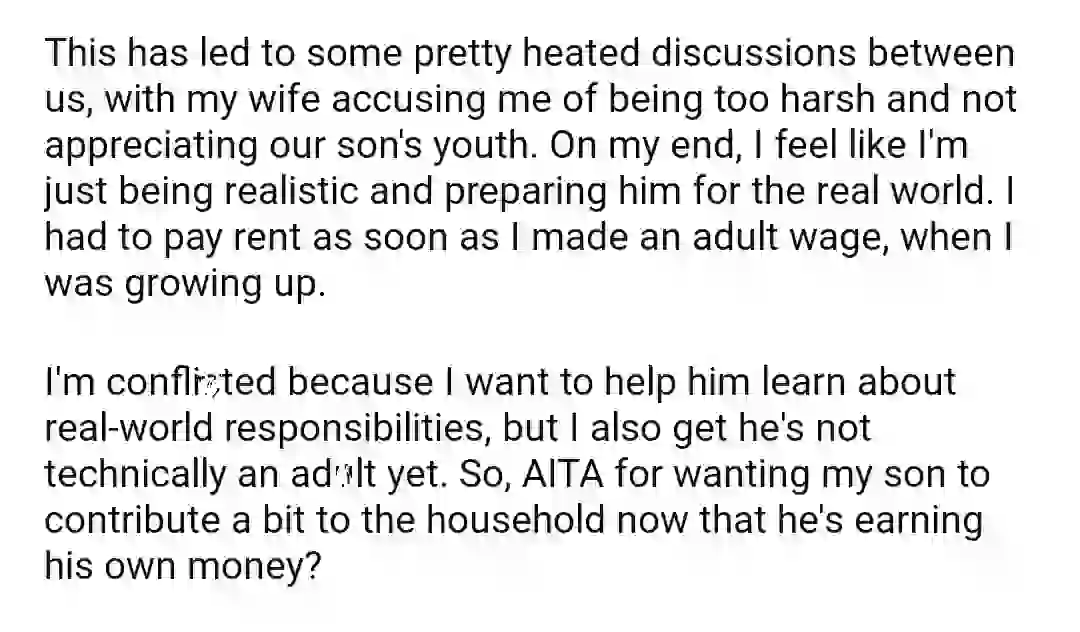 Do you think the parent is justified in asking their son to pay rent, or is it essential to support him fully during this time? Share your opinions in the comments below.
Do you think the parent is justified in asking their son to pay rent, or is it essential to support him fully during this time? Share your opinions in the comments below.
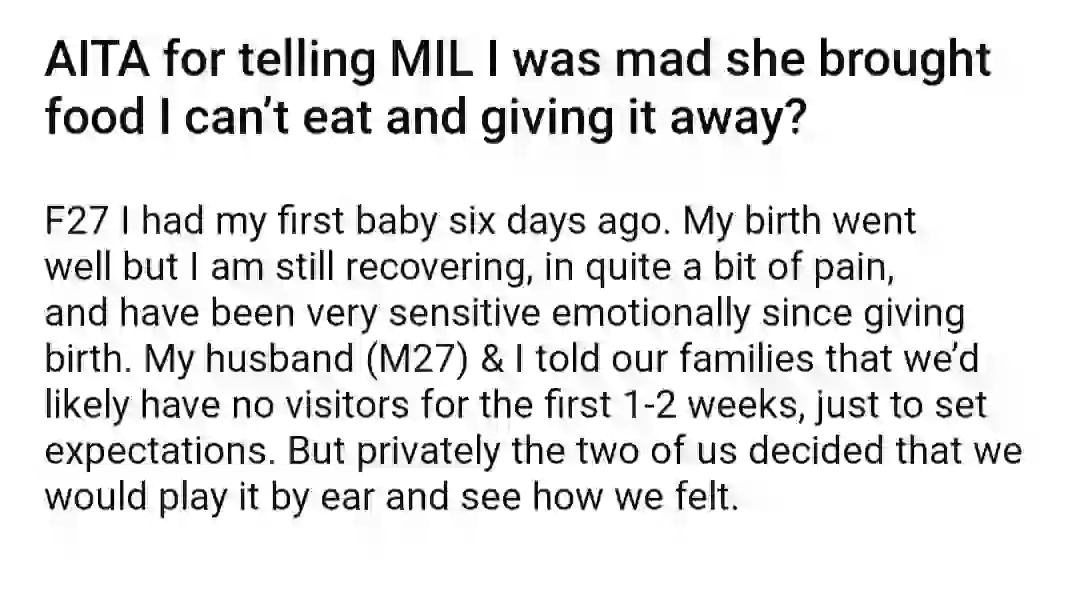 Recognizing her daughter’s need for assistance, the couple decided to allow the new mother’s mother to visit every other day. During her visits, the grandmother provided emotional support and practical help, which significantly benefited the family during this challenging time.
Tensions arose when the mother-in-law (MIL) discovered the frequency of visits by the new mother’s mother. Eager to meet her grandchild, the MIL decided to visit on the sixth day postpartum, but her visit took an unfortunate turn.
Recognizing her daughter’s need for assistance, the couple decided to allow the new mother’s mother to visit every other day. During her visits, the grandmother provided emotional support and practical help, which significantly benefited the family during this challenging time.
Tensions arose when the mother-in-law (MIL) discovered the frequency of visits by the new mother’s mother. Eager to meet her grandchild, the MIL decided to visit on the sixth day postpartum, but her visit took an unfortunate turn.
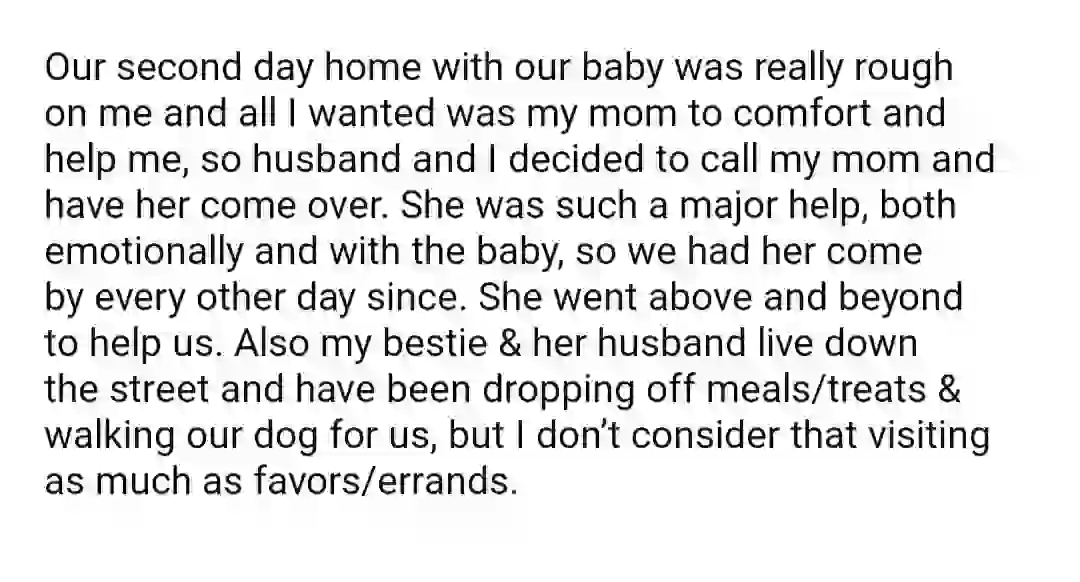 The MIL arrived with a meal containing gluten, despite being aware that her daughter-in-law has Celiac disease and cannot consume gluten. When confronted about this, she offered explanations rather than apologies, causing the new mother to become emotional and upset.
The MIL arrived with a meal containing gluten, despite being aware that her daughter-in-law has Celiac disease and cannot consume gluten. When confronted about this, she offered explanations rather than apologies, causing the new mother to become emotional and upset.
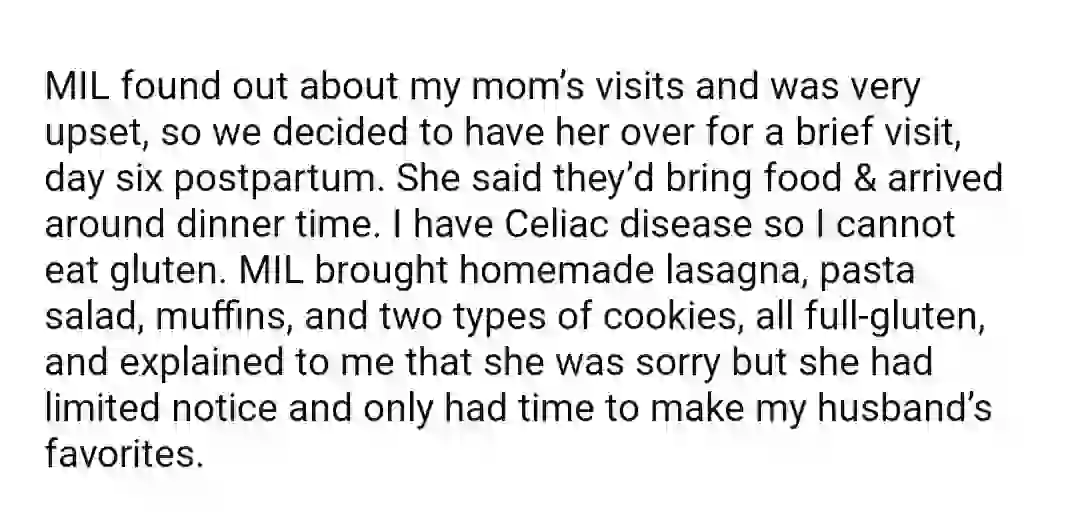 The situation escalated when the MIL made additional comments that came across as insensitive, suggesting that preparing gluten-free food was a time-consuming and burdensome task. Overwhelmed by her emotions, the new mother snapped at her MIL.
Following the visit, tensions escalated as the MIL began rallying people against the new mother, leading to family members taking sides. Throughout the ordeal, the new mother’s husband supported her and took steps to address the situation.
The situation escalated when the MIL made additional comments that came across as insensitive, suggesting that preparing gluten-free food was a time-consuming and burdensome task. Overwhelmed by her emotions, the new mother snapped at her MIL.
Following the visit, tensions escalated as the MIL began rallying people against the new mother, leading to family members taking sides. Throughout the ordeal, the new mother’s husband supported her and took steps to address the situation.
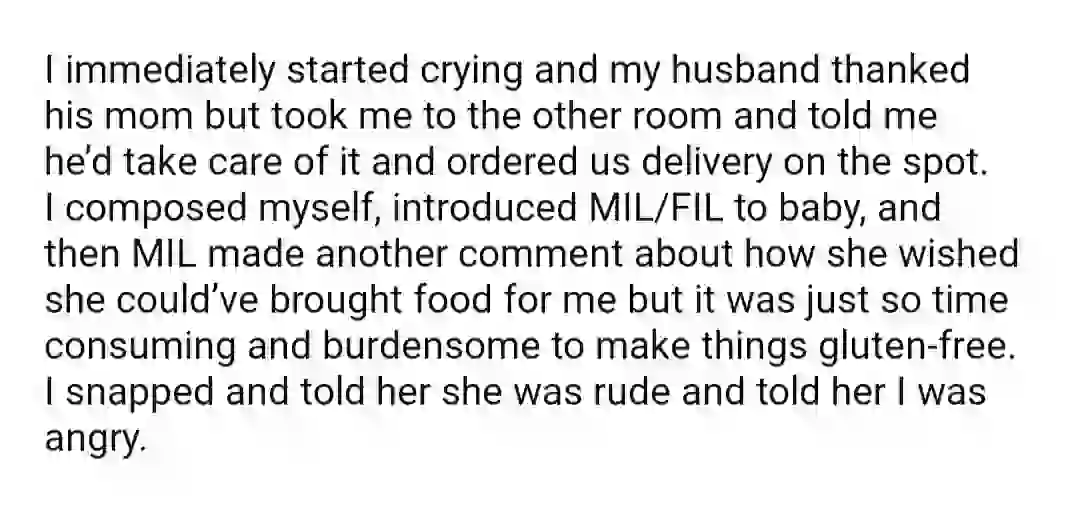 This situation highlights the challenges of managing family dynamics during the postpartum period, a time when emotions run high, and vulnerabilities are exposed. The new mother’s emotional response can be attributed to the exhaustion and sensitivity that often accompany the early days of parenthood.
This situation highlights the challenges of managing family dynamics during the postpartum period, a time when emotions run high, and vulnerabilities are exposed. The new mother’s emotional response can be attributed to the exhaustion and sensitivity that often accompany the early days of parenthood.
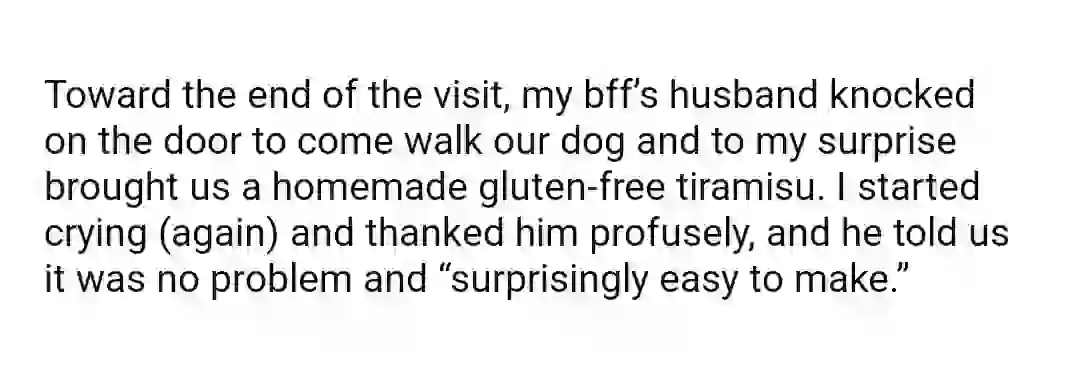 The MIL’s behavior during her visit was undoubtedly insensitive, as she brought gluten-containing food despite knowing about her daughter-in-law’s dietary restrictions. However, it is essential to remember that misunderstandings can occur in such emotionally charged moments.
The MIL’s behavior during her visit was undoubtedly insensitive, as she brought gluten-containing food despite knowing about her daughter-in-law’s dietary restrictions. However, it is essential to remember that misunderstandings can occur in such emotionally charged moments.
 The story serves as a reminder of the difficulties that can arise when managing family dynamics after childbirth. Rather than assigning blame, it is crucial to approach such situations with empathy and a willingness to communicate and reconcile.
The story serves as a reminder of the difficulties that can arise when managing family dynamics after childbirth. Rather than assigning blame, it is crucial to approach such situations with empathy and a willingness to communicate and reconcile.
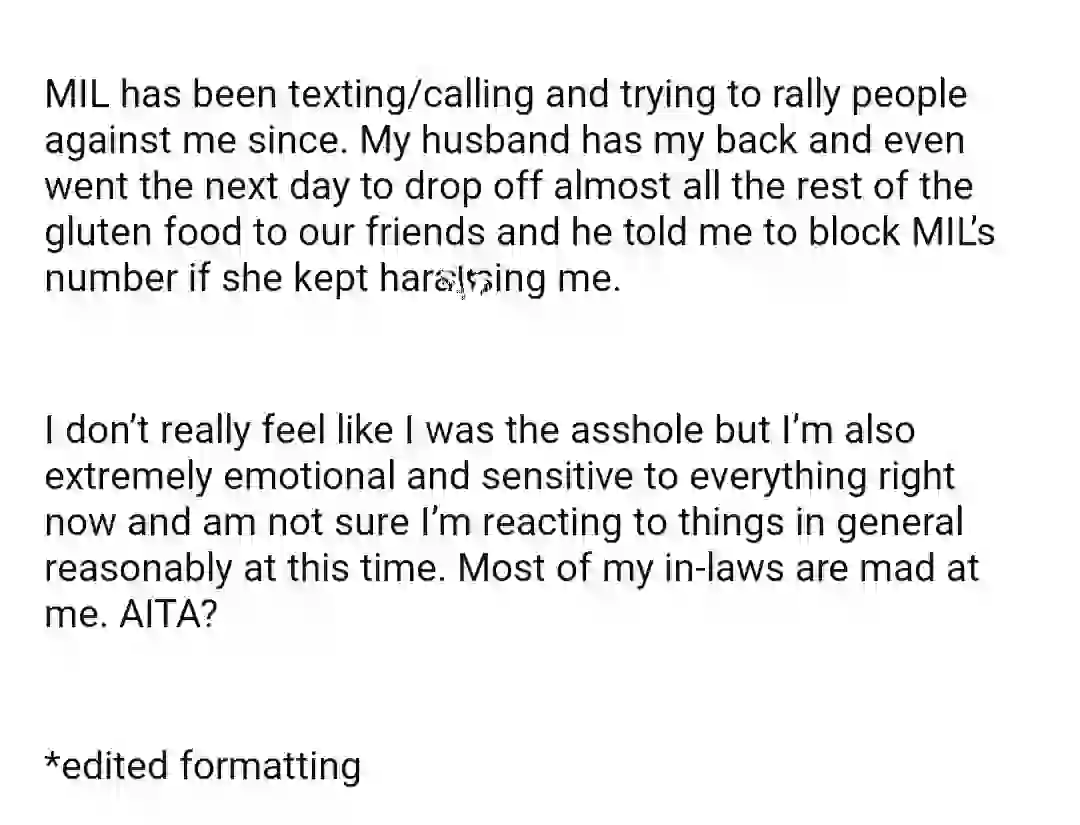 To gain further insights and opinions on this story, it is advisable to seek input from those involved and impartial individuals in the comments section. By fostering understanding and promoting dialogue, families can navigate such challenging moments with greater harmony and support.
To gain further insights and opinions on this story, it is advisable to seek input from those involved and impartial individuals in the comments section. By fostering understanding and promoting dialogue, families can navigate such challenging moments with greater harmony and support. 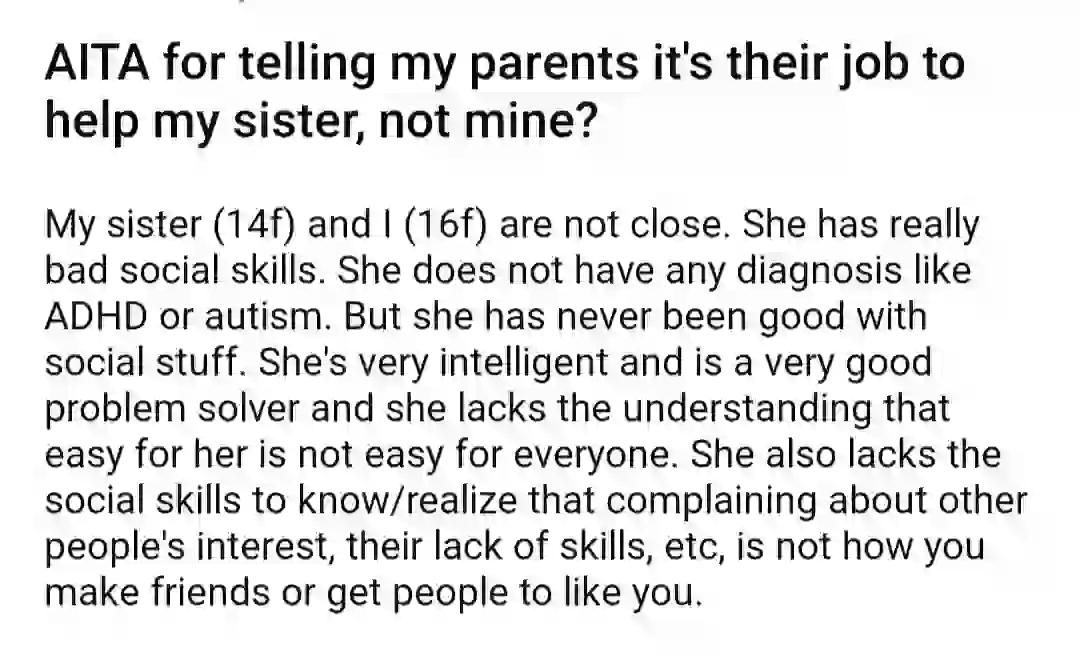 Painting a detailed picture, the narrator describes her sister as highly intelligent and an adept problem solver. However, her strengths are offset by a striking deficiency in understanding that what comes easily to her may not be the same for others. Moreover, her social skills seem to be seriously lacking, particularly in the art of making friends and connecting with others.
The Crux of the Problem:
The heart of the issue lies in how the 14-year-old sister handles her victories, especially when it comes to competitive games. Winning at board games becomes a platform for her to showcase her blunt and, at times, hurtful comments about her opponents’ skills and abilities. The older sibling is left feeling uncomfortable and disheartened by her sister’s behavior, particularly her gloating after victories.
Painting a detailed picture, the narrator describes her sister as highly intelligent and an adept problem solver. However, her strengths are offset by a striking deficiency in understanding that what comes easily to her may not be the same for others. Moreover, her social skills seem to be seriously lacking, particularly in the art of making friends and connecting with others.
The Crux of the Problem:
The heart of the issue lies in how the 14-year-old sister handles her victories, especially when it comes to competitive games. Winning at board games becomes a platform for her to showcase her blunt and, at times, hurtful comments about her opponents’ skills and abilities. The older sibling is left feeling uncomfortable and disheartened by her sister’s behavior, particularly her gloating after victories.
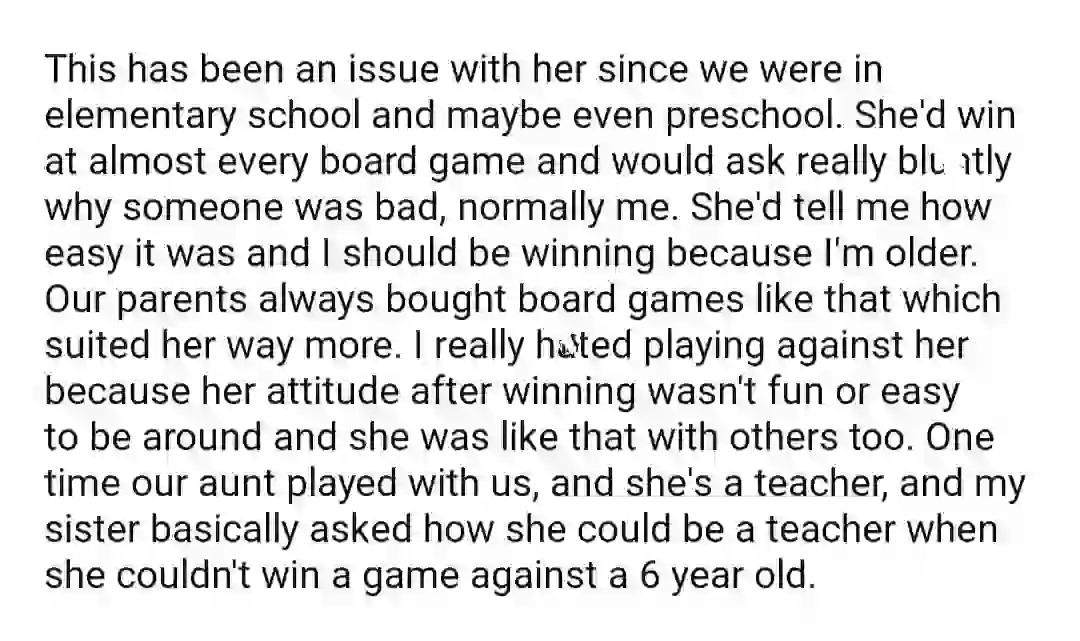 This disconnect also extends to video games, where the younger sister’s backseat gaming and critical comments disrupt the narrator’s gaming experience. Friends who come over to hang out are also subjected to the same treatment, leading to the younger sibling’s isolation.
Tantrums and strained family activities, like charades, reveal the severity of her reactions to situations where she doesn’t excel. Her inability to cope with losing ultimately results in the family banning these activities, adding to the tension at home.
This disconnect also extends to video games, where the younger sister’s backseat gaming and critical comments disrupt the narrator’s gaming experience. Friends who come over to hang out are also subjected to the same treatment, leading to the younger sibling’s isolation.
Tantrums and strained family activities, like charades, reveal the severity of her reactions to situations where she doesn’t excel. Her inability to cope with losing ultimately results in the family banning these activities, adding to the tension at home.
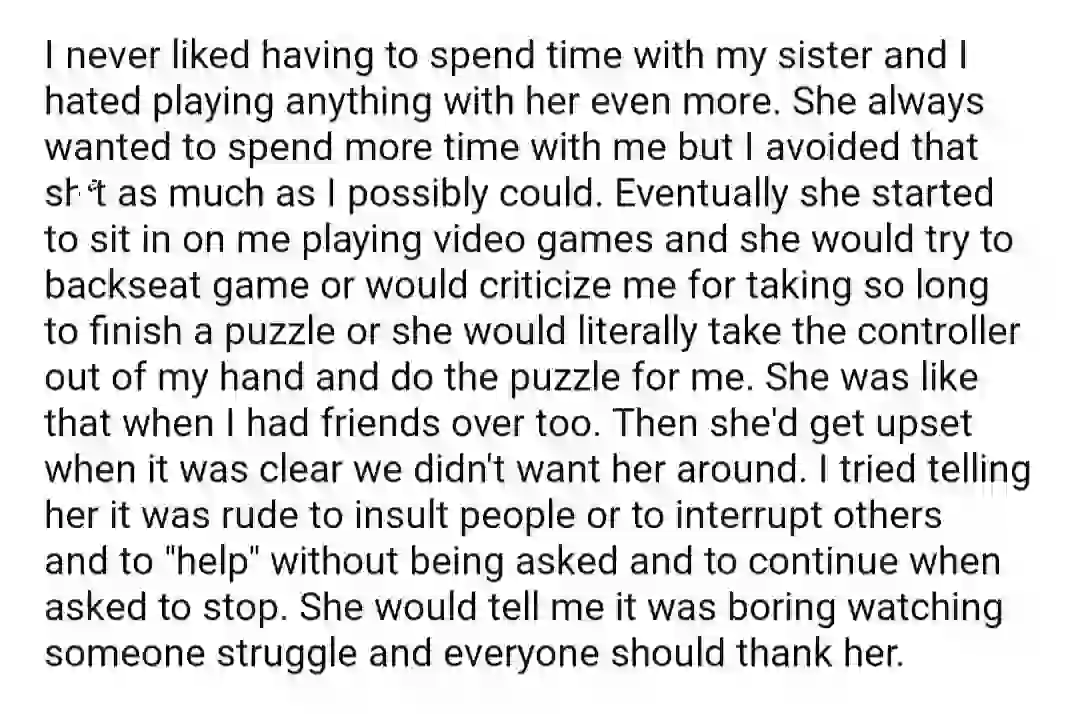 The narrator sheds light on her sister’s difficulties in maintaining friendships, noting that her tendency to criticize her friends’ interests and indirectly question their intelligence leads to her being ostracized. This, in turn, contributes to her growing social isolation.
The Conflict Escalates:
The crux of the story revolves around the narrator’s growing frustration with her sister’s behavior and her parents’ insistence that she make more of an effort to bond with her. This pressure eventually reaches its breaking point when the older sibling bluntly tells her parents that helping their younger daughter is their responsibility, not hers.
The narrator sheds light on her sister’s difficulties in maintaining friendships, noting that her tendency to criticize her friends’ interests and indirectly question their intelligence leads to her being ostracized. This, in turn, contributes to her growing social isolation.
The Conflict Escalates:
The crux of the story revolves around the narrator’s growing frustration with her sister’s behavior and her parents’ insistence that she make more of an effort to bond with her. This pressure eventually reaches its breaking point when the older sibling bluntly tells her parents that helping their younger daughter is their responsibility, not hers.
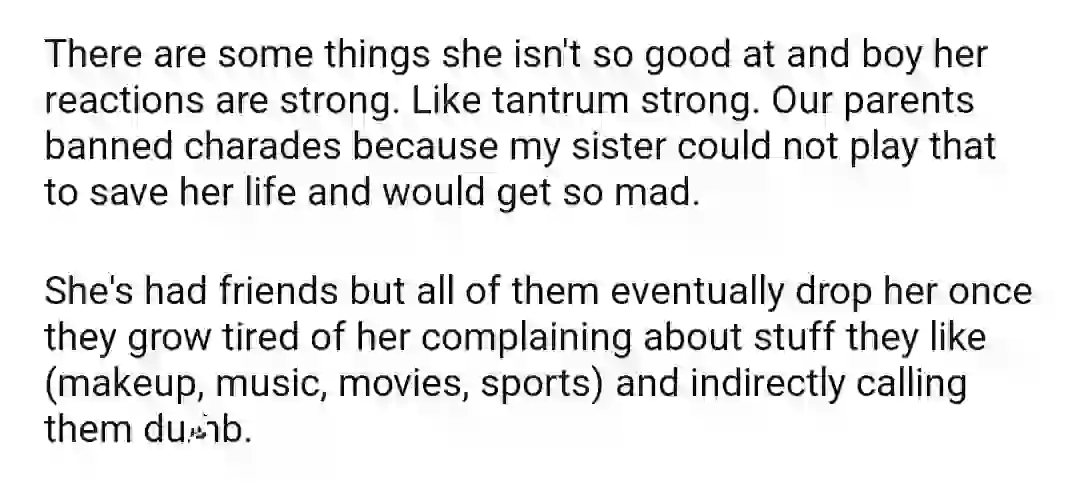 The Verdict:
This Reddit story delves into the intricate dynamics of sibling relationships, the challenges of dealing with a challenging family member, and the blurred lines between individual boundaries and familial obligations. As the Reddit community weighs in on this situation, opinions on whether the narrator is in the wrong or justified in her stance continue to diverge.
The Verdict:
This Reddit story delves into the intricate dynamics of sibling relationships, the challenges of dealing with a challenging family member, and the blurred lines between individual boundaries and familial obligations. As the Reddit community weighs in on this situation, opinions on whether the narrator is in the wrong or justified in her stance continue to diverge.
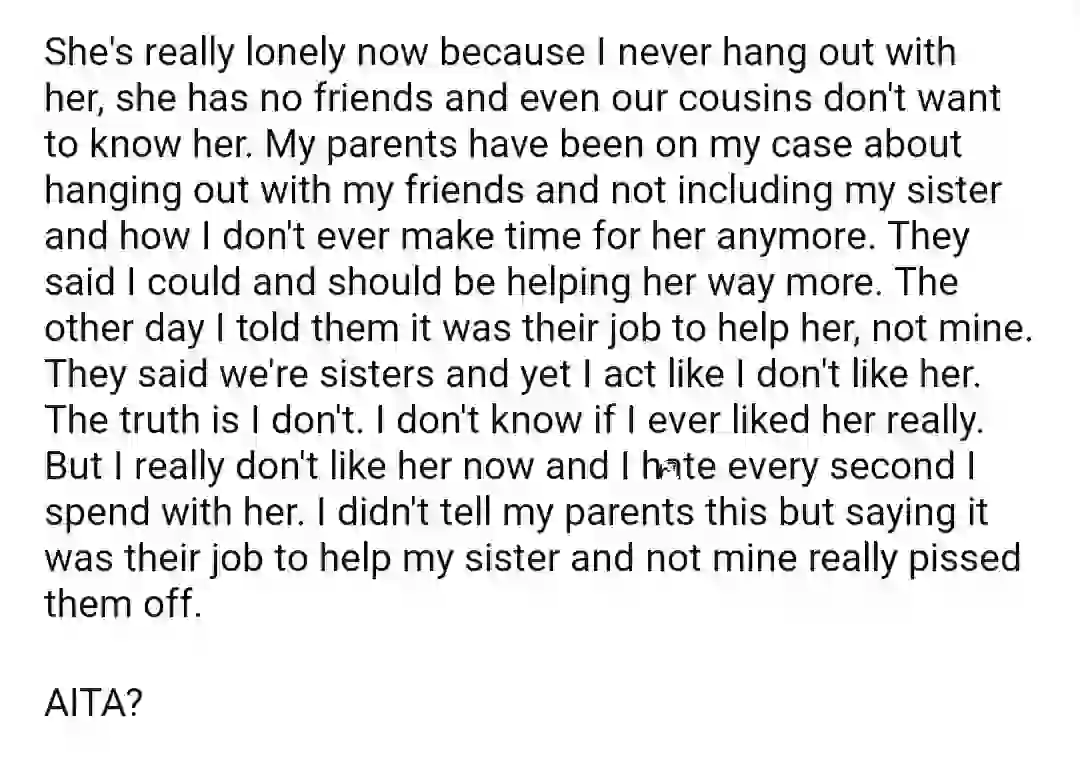 The story serves as a reminder that family dynamics are rarely straightforward, and the delicate balance between supporting loved ones and safeguarding personal boundaries can be challenging to navigate.
The story serves as a reminder that family dynamics are rarely straightforward, and the delicate balance between supporting loved ones and safeguarding personal boundaries can be challenging to navigate. 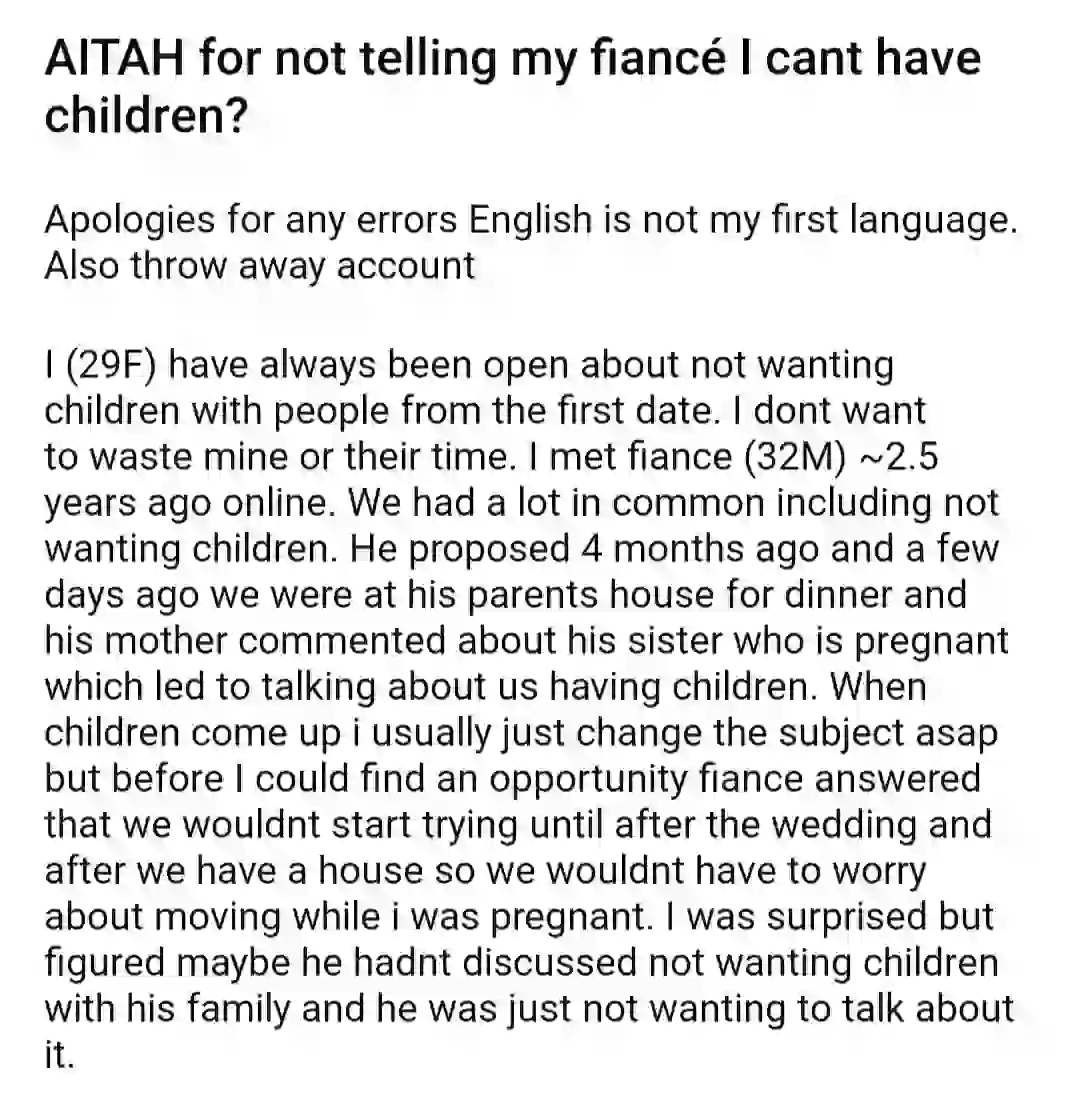 However, the issue arises when, during a family gathering, the fiancé unexpectedly hints at the possibility of wanting children. OP is taken aback, considering this a change from their initial agreement. When they later discuss it, the fiancé admits to having doubts and expresses the desire for children.
However, the issue arises when, during a family gathering, the fiancé unexpectedly hints at the possibility of wanting children. OP is taken aback, considering this a change from their initial agreement. When they later discuss it, the fiancé admits to having doubts and expresses the desire for children.
 OP reveals that she underwent sterilization at 25 due to the distress caused by an earlier pregnancy. She had not disclosed this information previously because, in her view, it did not matter—her stance on not wanting children remained firm.
OP reveals that she underwent sterilization at 25 due to the distress caused by an earlier pregnancy. She had not disclosed this information previously because, in her view, it did not matter—her stance on not wanting children remained firm.
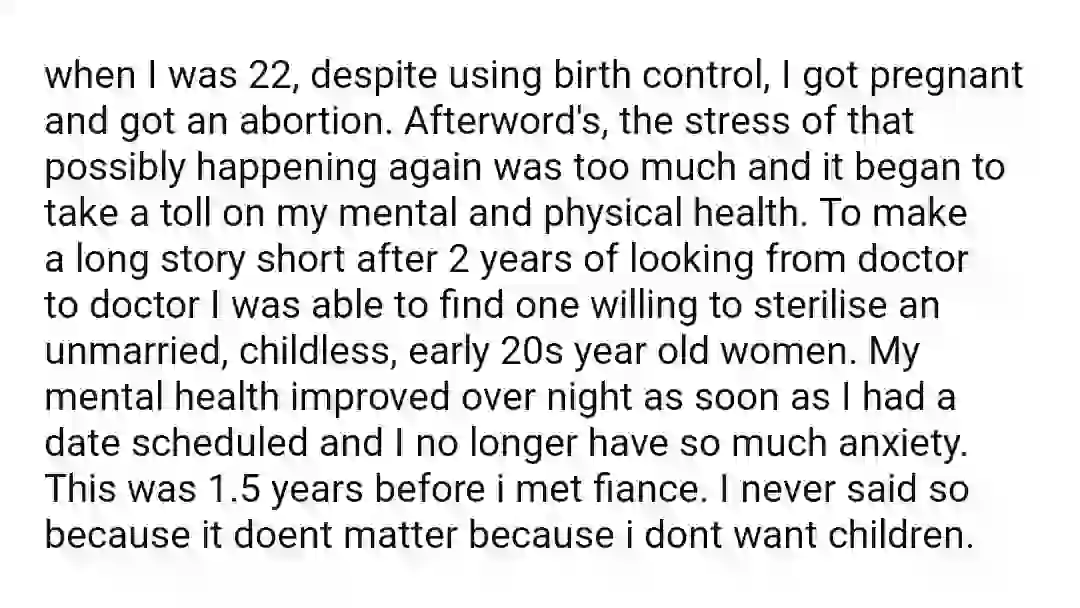 The fiancé’s reaction is mixed, consisting of anger, feeling betrayed, and suggesting he might not have dated OP had he known about her sterilization. The relationship becomes strained, and they have a significant argument.
The fiancé’s reaction is mixed, consisting of anger, feeling betrayed, and suggesting he might not have dated OP had he known about her sterilization. The relationship becomes strained, and they have a significant argument.
 Let’s assess the situation:
Let’s assess the situation:
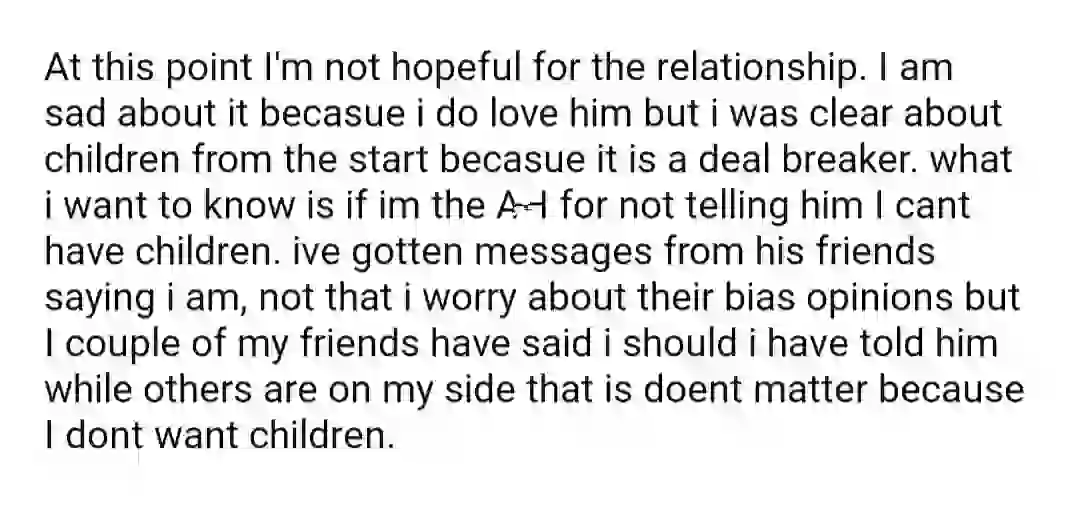 In conclusion, while the situation is undoubtedly emotionally charged, it’s essential to recognize that OP’s stance on having children remained consistent throughout her relationship with her fiancé. Whether or not she should have disclosed her sterilization earlier is debatable, but it doesn’t change the fact that both parties currently have conflicting views on a significant life choice.
In conclusion, while the situation is undoubtedly emotionally charged, it’s essential to recognize that OP’s stance on having children remained consistent throughout her relationship with her fiancé. Whether or not she should have disclosed her sterilization earlier is debatable, but it doesn’t change the fact that both parties currently have conflicting views on a significant life choice.
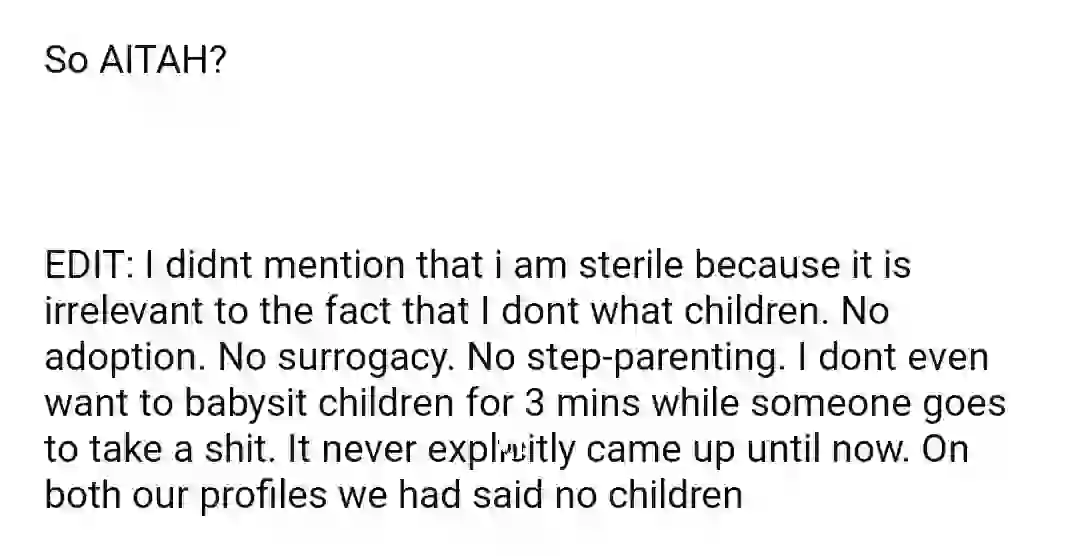 The central issue lies in the divergence of their views on having children, which is a substantial challenge to their compatibility. Open and respectful communication is key for them to navigate this difficult situation and decide whether they can move forward as a couple or if their differences are irreconcilable.
Find Full Story here:
The central issue lies in the divergence of their views on having children, which is a substantial challenge to their compatibility. Open and respectful communication is key for them to navigate this difficult situation and decide whether they can move forward as a couple or if their differences are irreconcilable.
Find Full Story here: